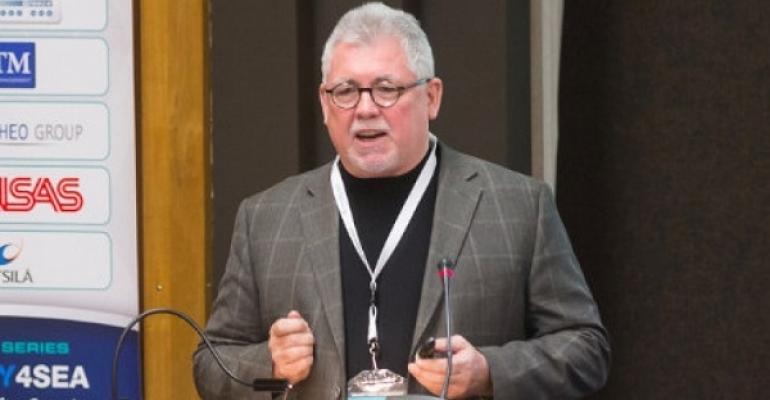Instead it is plagued by antiquated and conflicted bureaucracy, he lamented. “We layer modern technology on top of old-fashioned business processes. The old-fashioned structures of regulators, clubs, lobbies and representative bodies no longer fit with the new world. Nor do they move fast enough to keep up,” Coles said.
Slamming everyone from class societies to flag states, Coles said: “Attitude lies at the heart of our inability to change. We have a real problem with how we regulate the industry.”
For example, the class societies and flag states continue to be influenced by owners and unions to compromise safety, while class and the P&I Clubs find themselves balancing safety against revenue as they weigh the cost of making the right decisions against losing business.
“This allows old-fashioned rules to remain in place and to be enforced,” Coles said, while asking: “How can it make sense in our modern world to allow human life or our precious environment to be weighed on a scale of risk and be treated as a statistical probability?”
Going as far as to question if the IMO should continue to have the mandate on safety, Coles criticised the world maritime body, saying: “Today, final decisions seem to be political, voted in plenaries where half the audience is asleep, many others don’t care and a select, motivated few busily lobby their agendas.”
The infrastructure of the industry is as much to blame, Coles said. “The regulators are failing to drive home a standardized solution for a safer, efficient, greener ship and solution. We have reached a frankly ridiculous point where a lobby of suppliers, owners and think-tanks creates a bureaucrat’s solution in committee,” he railed.
“That can take years to come to any conclusion. This is not going to work in the new world. We cannot keep designing a donkey when we are looking for a racehorse,” Coles emphasised.
He noted that in the maritime space, does seems to be coming from engine manufacturers and the use of alternative fuels and more efficient engines. While acknowledging that “progress is important for the preservation of our oceans and should be applauded”, Coles said “many other issues stall while talks roll on with the regulators and other background influences”.
While some might point to the growing use of connectivity or the use of monitoring and data for analytics and performance as signs of progress, Coles pointed out that currently these solutions are fragmented IoT applications which are unconnected and not part of an integrated solution. “There has been progress but we have not done enough,” he suggested.
Taking aim at his fellow equipment suppliers, Coles said: “Meanwhile it seems at times that communications suppliers delight in totally confusing the market with their lack of transparency. If there was ever a need for some clarity and consolidation, the Satcoms sector is a strong candidate.”
Turning to the growing divide between the logistics and maritime operations sectors, Coles noted that the pace of change in the former sector far exceeds that seen in maritime operations.
“Maritime operations and infrastructure thinking seems to change at a snail’s pace. We seem to be content to have old-fashioned ships and an old-fashioned business infrastructure sitting alongside modern logistics,” Coles declared.
“Today’s maritime operations and fleet processes continue to be in limbo. We are disconnected from the rest of the ecosystem. The tools are in place, there is an ability to share decisions, information and monitor data across multiple stakeholders, but it is not being done,” said Coles.
“We confuse logistics with operations, and port information with safe navigation. We have to be able to separate the elements so that the right solution is used for the right problem,” he warned.
Meanwhile, shippers are being forced to look at the new technologies as they face up to the inevitable commoditisation of the sector. Remarking on how much has been made of Maersk’s intention to focus more on logistics than being a pure operator, Coles said the impact of this development on the freight forwarders would be irrelevant as “I think freight forwarders are going to disappear”.
He pointed out how in the last year large container lines have spoken of embracing Blockchain, while some in the dry bulk sector have introduced online bidding for their cargoes.
The other significant development was the emergence of numerous disruptor start-ups, Coles said. They provide solutions to many aspects of logistics and the value chain, such as booking cargo space, he said, while reiterating that these applications all apply to shipping, not maritime operations per se.
Concluding, Coles asked his audience to imagine a new maritime world.
“This is the maritime world of a green, safe and efficient means of transporting goods. Where we have reduced the human element risks, provided a greener ship and, operations fit for purpose. Most importantly, this is an environment where the younger generation will actually want to carve out a career in the maritime industry.”
Copyright © 2024. All rights reserved. Seatrade, a trading name of Informa Markets (UK) Limited. Add Seatrade Maritime News to your Google News feed.


